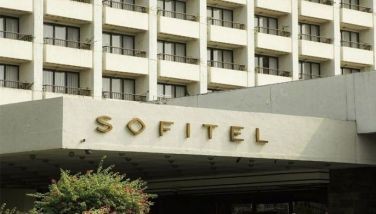Special Report: Tadeco – a fair deal or not?
(First of two parts)
MANILA, Philippines - Speaker Pantaleon Alvarez’s move to file a graft complaint against his ally and fellow lawmaker, Davao del Norte 2nd District Representative Antonio “Tonyboy” Floirendo Jr. left many in the political and business circles in disbelief.
The two Davaoeños, after all, have been friends since way back.
The rumor mill says the falling out began when their paramours fought over a seat during last year’s Masskara Festival in Bacolod. Others point to an alleged Floirendo-led campaign to oust Alvarez from his position as House Speaker.
But Alvarez said the real issue is the deal between Floirendo’s Tagum Agricultural Development Company Inc. (Tadeco) and the Bureau of Corrections (BuCor).
As such, Alvarez filed House Resolution 867 seeking an inquiry into the agreement. He also filed a graft complaint before the Office of the Ombudsman against Floirendo.
Whatever Alvarez’s real agenda in filing the charges, the decades-old Tadeco deal may indeed merit a second look.
Tadeco is the banana company founded by Floirendo’s father, the late Antonio Floirendo Sr., known as the Banana King.
Tadeco started when the elder Floirendo obtained a proclamation from former president Elpidio Quirino, granting him the title to over a thousand hectares of unproductive swampland.
Floirendo cultivated the swampland into an abaca plantation, and after a few years, Tadeco became the largest abaca producer in the world.
Eventually, he shifted his operations to bananas. With the help of foreign capital, Tadeco began phasing out its abacas in 1968. By 1971, the company was already exporting bananas to the Japanese market.
Tadeco expanded with more banana plantations around Davao.
The rest, as they say, is history.
However, not many people know that even during Tadeco’s early years, issues similar to those raised by Alvarez had already surfaced.
For instance, according to the book “Multinationals and the Restructuring of the World Economy,” edited by Michael Taylor and Nigel Thrift, Tadeco was among the corporations that flourished in Mindanao in the early 1970s because of “privileged access to government land at low rent.”
The book, published in 2012, looks at ways by which multinational corporations contributed to the restructuring of the world economy.
“By 1982, its assets reached P290 million and undoubtedly it was this major source of accumulation that financed Floirendo’s emergence as a multinational entrepreneur through his close
association with former president Ferdinand Marcos ensured that all his other enterprises flourished,” according to the book, referring to the elder Floirendo.
“One executive of the company stated confidentially in 1984 that Tadeco was still paying to the Bureau only P250 per hectare, plus 10 centavos per box exported, while some other corporations were paying rents over P1,000 per hectare to local landowners,” it also said.
Against this backdrop, the issues raised by Alvarez deserve closer scrutiny.
The Speaker raised two main issues: One is that the contract between Tadeco and BuCor is disadvantageous to the government and that Floirendo, as a lawmaker, did not divest his stake in the company when it renewed the joint venture agreement with BuCor in 2003.
Tadeco and BuCor entered into a joint venture agreement on July 11, 1969, allowing the Floirendo family company to lease from Bucor approximately 3,000 hectares of land located in the Davao Penal Colony (Dapecol).
According to the agreement, Tadeco would develop and utilize the land as a banana plantation.
Tadeco and BuCor then executed a consolidated joint venture agreement dated Sept. 26, 1979 in which the former leased 5,212.46 hectares of land from the latter and extended the lease period to 25 years – longer the usual 10-year term.
In 1989, the agreement was amended to escalate rates in land rentals, royalties and profit shares.
The two parties renewed the agreement on May 21, 2003. Under the amended deal, BuCor would receive a guaranteed annual production share of P26.5 million, which would automatically increase by 10 percent every five years.
Alvarez said that based on prevailing industry practices, government should be getting more.
“The existing contract, while guaranteeing BuCor a share of P26.54 million per year for 5,308.36 hectares, actually prejudices the same since the prevailing price of lease contracts in that area is P25,000 per hectare per year. Given the above figures, the government is prejudiced, at the very least by as much as P106.2 million per year,” Alvarez claimed.
He said that at P26.54 million a year for 5,308.38 hectares, the effective lease rate is only P5,000 per hectare.
He said similar developed agricultural lands could even fetch as much as P200,000 per hectare, meaning Tadeco should be paying government up to P1.061 billion per year.
Furthermore, Alvarez said BuCor’s share is only P1.35428 or $0.0202 per box in contrast to the export price of bananas at P592 or $12 per box to China, the Middle East, Japan as well as other markets.
Given the present exchange rate of P50 for every $1, the difference is roughly P600 per box.
With Tadeco’s annual sales of 30 million boxes per year at P1.3548 per box, the government’s share is estimated at roughly P40.5 million annually versus the company’s annual revenues of P18 billion, Alvarez said.
At five percent per box, government should be getting P900 million a year based on Tadeco’s yearly sales of P18 billion, the Speaker argued.
Aside from the alleged lopsided provisions of the contract, Alvarez said there have been serious allegations that workers in the banana plantation operated by Tadeco have been ill-treated and exploited.
On the divestment issue, Alvarez alleged Floirendo violated Section 3 of Republic Act No. 3019, otherwise known as the Anti-Graft and Corrupt Practices Act, prompting him to file a complaint against his erstwhile friend before the Office of the Ombudsman.
Alvarez claimed that as an elected member of Congress, Floirendo did not divest his stake in the company, which had a contract with the government.
“Thus, because of this gross conflict of interest, which the law precisely has intended to prevent, Floirendo is liable under the Anti-Graft Law.”
According to Section 3 h of the Anti-Graft and Corrupt Practices Act, it is unlawful for public officers to have direct or indirect financing or pecuniary interest in any business, contract or transaction in connection with which he intervenes or takes part in his official capacity, or in which he is prohibited by the Constitution or by any law from having any interest.
Clearly, Alvarez said the banana tycoon has “financial and pecuniary interest in Tadeco and Anflo Management and Investment Corp. (Anflocor).” Anflocor is Tadeco’s parent company.
“It was in 2003 that the consolidated joint venture agreement between Tadeco and BuCor was renewed and extended for another 25 years.
Moreover, during this period, Floirendo was the duly elected district representative of the 2nd District of Davao del Norte,” Alvarez said.
To sum it up, the Speaker said Tadeco – with Floirendo on board as a substantial stockholder – was able to seal a long-term agreement with the government.
According to company documents, Floirendo owned 75,000 shares of stock of the corporation and that from 1996 to 1999, he served as member of Tadeco’s board and the company’s executive vice-president.
Records also show that from 2003 to 2007, while Floirendo was not part of the board, he still owned substantial shares of stock in the company.
In 2008, he joined the board again as vice chairman.
Furthermore, from 1997 to 2015, Floirendo held various positions in Anflocor such as director, executive vice president, vice chairman, and even chairman.
This meant that in 2003, Floirendo, indeed had “financial and pecuniary interest” in the said contract with the government, in his capacity as substantial shareholder and member of the board of both Tadeco and Anfloccor.
Fr. Joaquin Bernas, a constitutionalist, said legislators “cannot be members of the board of corporations with contracts with the government.”
As to the scope of this prohibition, Bernas says “(t)he prohibited pecuniary benefit could be direct or indirect and, thus, would cover pecuniary benefit for relatives.”
Tadeco has vehemently denied the allegations raised by Alvarez.
Floirendo said he was not involved in the negotiations for the agreement with Bucor in 2003, which was signed by his father.
“Because these allegations happened 14 years ago, I am curious as to his (Alvarez’s) real intentions and the real issues. Meanwhile, I can assure everyone that I was not in any way involved in the negotiation of the Joint Venture Agreement between Tagum and BuCor in 2003,” Floirendo said.
Tadeco also dismissed allegations that its agreement in BuCor was disadvantageous to the government.
“The arrangement between Tadeco and BuCor is not a lease arrangement but a Joint Venture that is primarily aimed at the rehabilitation of the inmates in Davao Penal Colony (Dapecol). This rehabilitation program has been found to be very successful by BuCor up to the extent that the latter has even requested Tadeco to replicate the joint venture agreement program to its penal colony in Iwahig, Palawan,” Tadeco said.
Furthermore, Tadeco said the agreement has been reviewed and found to be advantageous to the government “numerous times by the executive and the legislative departments in past administrations.”
The most recent review was in the 15th Congress in 2012 or five years ago.
“The Department of Justice, through its representative lawyer Teresita Domingo, said during a congressional review that the JVA is actually above board,” Tadeco said.
On the profit sharing rates, Tadeco said the rates the parties agreed on during the renewal in 2003 were the most competitive rates at the time.
Likewise, it said that efforts to adjust rates were affected by the change of leadership in BuCor.
“As can be understood, the changes in economic conditions over the past 13 years have affected the competitiveness of such rates. Tadeco understands this and stated back in 2011 its willingness to discuss and adjust the rates as it had done in the past. This effort to adjust the rates did not gain any momentum because of the continuous change of leadership in the Bucor,” Tadeco said.
Tadeco said it provides at least 18,000 jobs both for inmates and farmers in the area.
Company documents from Tadeco, cited by Philippine Star columnist Alex Magno also indicate that in 2014, the government received P32.327 million in guaranteed production share and P8.76 million in profit share.
Last year, the guaranteed production share went up to P35.327 million while profit share went up to P9.527million, Magno said.
On labor conditions in the plantation, Tadeco said there is no truth to the allegation of ill treatment of workers in the plantation.
“Such allegation is completely baseless. Tadeco takes good care of its workers. This is evident in the high production yield of Tadeco, indicating that the workers are well motivated and very productive,” it also said. (To be concluded)
- Latest
- Trending

























